初中英语常用词组辨析(31组)
初中英语词汇辨析30组

There are some new books on the desk. 桌子上有一些新书。 Would you like some water? (表征求、询问) 您来点儿水吗?
Are there any new books on desk? 桌子上有新书吗?
There isn’t any milk in the glass. 杯子里没有牛奶了。
词汇
用法
long before 很早以前;在……以前很久
before long 不久以后
8.alone / lonely
例句
He retired long before the war. 他在战争之前早就退休了。 Long before morning, all was done again. 天还没亮,一切又重新开始。 It won't be long before you regret what you have done. 过不了多久,你就会后悔你做的事。 Before long, we were deep in conversation. 我们很快就进入深谈。 I'll be seeing you before long. 不久,我就会见到你。 We'll see why before long. 我们不久后将看到为什么。
When did you get home / there / here?
12.agree with / agree on(upon) / agree to
词汇 agree with agree on (agree upon)
agree to
用法
例句
agree with sb. agree with sth.
初中英语词汇词组辨析

56.quite ,very 很,十分1quite a +形容词+名词“一个相当……的……”quite a clever boy 一个相当聪明的男孩2a very+形容词+名词“一个非常……的”a very clever boy 一个非常聪明的男孩57.say,speak,talk,tell 说1say 后接说的内容,He says he likes English very much.2speak 后接语言,I can speak Japanese3talk “讨论,谈论”,可作动词也可作名词,talk about sth 谈论某件事,talk with /to sb 和某人谈话4tell ,“告诉,讲述”tell sb sth 告诉某人某件事,tell a story ,tell a lie 撒谎58.since, for 用于完成时态1since 后接时间点. Lucy has lived there since 1955. Lucy 自从1955年以来一直住在这里。
接“时间段+ago”I have been teaching since 10 years ago. 我教英语有10年了接“一般过去时态的句子”We have known each other since we were young.我们从小就认识。
2for 后接时间段。
We have studied for 9 years.我们学英语已经9年了。
59. so , such,如此,这样。
So /such ……that+否定句子=too……to+动词原形;so/such…+肯定句子=enough to+动词原形1so,修饰形容词或many,much,little,few(so good a boy 如此好的一个男孩(so much difficult 太多的困难He is so young that he can’t go to school=He is too young to go to school.他太小了,不能去上学。
初中英语易混词、短语辨析
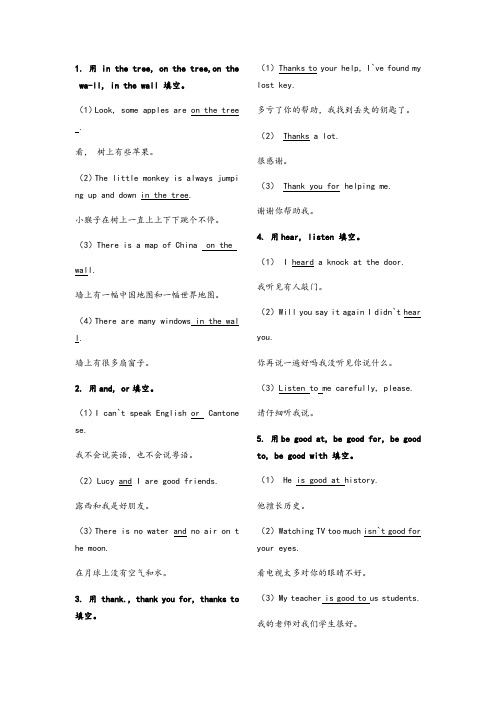
1. 用 in the tree, on the tree,on the wa-ll, in the wall 填空。
(1)Look, some apples are on the tree .看,树上有些苹果。
(2)The little monkey is always jumpi ng up and down in the tree.小猴子在树上一直上上下下跳个不停。
(3)There is a map of China on thewall.墙上有一幅中国地图和一幅世界地图。
(4)There are many windows in the wal l.墙上有很多扇窗子。
2. 用and, or填空。
(1)I can`t speak English or Cantone se.我不会说英语,也不会说粤语。
(2)Lucy and I are good friends.露西和我是好朋友。
(3)There is no water and no air on t he moon.在月球上没有空气和水。
3. 用 thank., thank you for, thanks to 填空。
(1)Thanks to your help, I`ve found my lost key.多亏了你的帮助,我找到丢失的钥匙了。
(2) Thanks a lot.很感谢。
(3) Thank you for helping me.谢谢你帮助我。
4. 用hear, listen 填空。
(1) I heard a knock at the door.我听见有人敲门。
(2)Will you say it again I didn`t hearyou.你再说一遍好吗我没听见你说什么。
(3)Listen to me carefully, please.请仔细听我说。
5. 用be good at, be good for, be good to, be good with 填空。
初中英语重点短语辨析

初中英语重点短语辨析1. be made of / be made fromⅠ. be made of “由……制成/造”成品看得出原料。
如:The desk is made of wood. 这张桌子是木头制成的。
Ⅱ. be made from “由……制造/成”成品看不出原料。
如;Paper is made from rags.纸是由破布做的。
(已看不出原料)2. be pleased with/ at/ toⅠ. be pleased with “对……人/物,感到满意”介词with后接人或物。
如:① Both Mark and her mother were pleased with the girl. 马克和他妈妈都有喜欢这个女孩。
② I wasn’t very pleased with / at my exam results. 我对自己的考试成绩不太满意。
Ⅱ. be pleased at “对……某事/物,感到满意”。
介词at 常与事物搭配使用。
He was very pleased at the news.他对这个消息感到很满意。
Ⅲ. be pleased to “乐意……;因……而高兴”。
to 不是介词,而是小品词。
后接动词原形。
如:① I shall be pleased to go. 我将乐意去。
② We are quite pleased to be working in this country. 能在这个国家工作,我们是十分高兴的。
3. be sure of/ be sure to do/ be sure thatⅠ.be sure of “确信对……有把握”后接名词、代词或动词-ing 形式,表对客观事物有肯定的认识和判断,主语必须是人。
如:① As David joined our team, we are sure of winning the game this time.由于David参加了我们的球队,我们这次有把握取胜。
初中英语300组常用词语辨析完整版

初中英语300组常用词语辨析Lesson495.bloom/flower/blossomⅠ.bloom指观赏用的花。
如:玫瑰;菊花;牡丹等。
Ⅱ.flower是普通用语。
Ⅲ.blossom指果树上的花。
96.boat/shipⅠ.boat“船、艇,”是普通用语。
主要指用浆、篙、帆或引擎的小船、小艇,但有时也指大轮船。
如:1We crossed the river by boat.我们乘船过河。
2They pulled the boat up on to the shore.他们把这条船拖上了岸。
(指小船③When does the boat leave for Shanghai?(指轮船Ⅱ.ship“船、舰,”多指大的航海船只。
如:1The ship is at sea.船厂在航海。
2They went to Guangahou by ship.他们乘船去广州。
97.bold/brave/courageousⅠ.bold“大胆的、勇敢的”着重指大胆、勇敢的气质,表现出有胆量、敢闯或敢于对抗而不畏缩。
如:1Be bold!勇敢些!2It’s very bold of us to v enture to go to sea.我们冒险航海是很勇敢的。
Ⅱ.brave“勇敢的”,应用最广泛,通常指在危险、困难或可怕的情况下表现勇猛而畏缩。
如:1Be brave!勇敢些!2It was brave of him to enter the burning building.他敢进入那燃烧着的房屋,真是勇敢。
Ⅲ.courageous“勇敢的,无畏的”表示由于有勇敢的气质或不屈不挠的精神而能无畏地自觉地对付某种事情,常常用于表示道义上的勇敢。
如:1He is courageous in telling the truth.他敢于讲实话。
2We hope that they will courageously shoulder their responsibilities and overcome all difficulties.我们希望能够勇敢地负起责任,克服一切困难。
最新初中英语高频词汇辨析500组

最新初中英语高频词汇辨析500 组A1.about around round 作副词时都含“四处” 、“遍地”的意思。
about系常用词,如: look about around 具有about的基本意思,没有about 正式 , 如 : travel around四处看。
因此look about=look around, 但在下列短语里各处旅行aroundround和 around 在非正式用法中可以互换, 但一般用round时更简练。
在正式用语中, 一般用round指“旋转”, 而用around指“处处”, “到处”, 如 :She turned round at such a noise.听到这样的吵声, 她回头看。
I have been looking for it all around.我到处都找过了。
另外 , 英国人用round 的地方 , 美国人倾向于用around,如:[英 ] Winter comes round.[美 ] Winter comes around.2. above all; after all ; at allabove all 意为“尤其是” 、“首先”、“最重要的是” ,常位于句首或句中,作插入语,起强调作用。
如:But above all tell me quickly what I have to do.可首先快些告诉我该做什么。
A clock must above all keeps good time .时钟最重要的是必须走得准。
after all 意为“毕竟” 、“终究”、“终归”、“到底”,在句中位置较灵活。
可位于句首、句中或句末。
如:After all , your birthday is only two weeks away .毕竟,两周后就是你的生日。
He is, after all , a small child .他毕竟还是个小孩子。
38个初中易混单词及短语的用法及区别
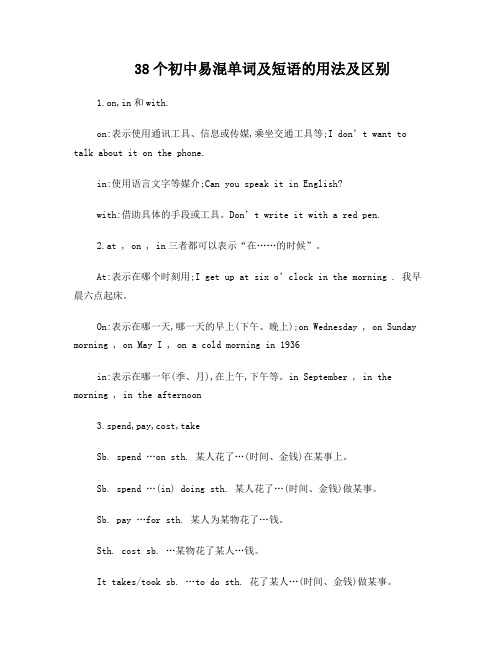
38个初中易混单词及短语的用法及区别1.on,in和with.on:表示使用通讯工具、信息或传媒,乘坐交通工具等;I don’t want to talk about it on the phone.in:使用语言文字等媒介;Can you speak it in English?with:借助具体的手段或工具。
Don’t write it with a red pen.2.at , on , in三者都可以表示“在……的时候”。
At:表示在哪个时刻用;I get up at six o’clock in the morning . 我早晨六点起床。
On:表示在哪一天,哪一天的早上(下午、晚上);on Wednesday , on Sunday morning , on May I , on a cold morning in 1936in:表示在哪一年(季、月),在上午,下午等。
in September , in the morning , in the afternoon3.spend,pay,cost,takeSb. spend …on sth. 某人花了…(时间、金钱)在某事上。
Sb. spend …(in) doing sth. 某人花了…(时间、金钱)做某事。
Sb. pay …for sth. 某人为某物花了…钱。
Sth. cost sb. …某物花了某人…钱。
It takes/took sb. …to do sth. 花了某人…(时间、金钱)做某事。
4.too much, too many, much tootoo much + 不可数名词too many + 可数名词much too + 形容词5.not …until &untilnot …until 直到…才…(主句动词是短暂性动词)until 一直到…(主句中使用延续性动词)6.few, a few; little , a little. 虽然都表示“少”,但(1)few, a few是可数的, little, a little是不可数的。
初中英语常用词组辨析(31组)
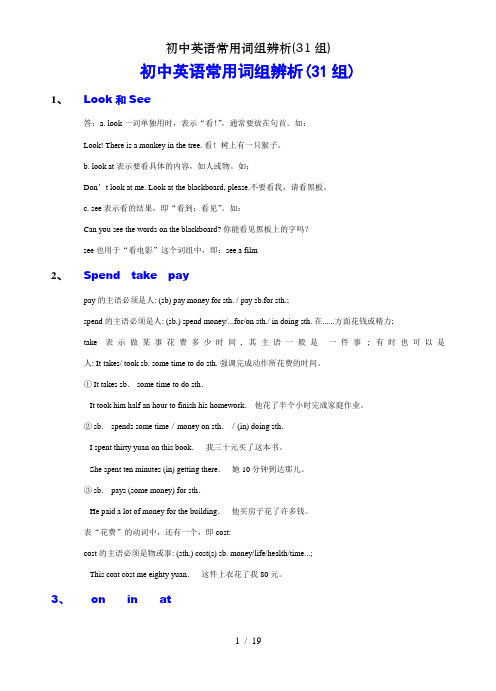
初中英语常用词组辨析(31组)1、Look和See答:a. look一词单独用时,表示“看!”,通常要放在句首。
如:Look! There is a monkey in the tree. 看!树上有一只猴子。
b. look at表示要看具体的内容,如人或物。
如:Don’t look at me. Look at the blackboard, please.不要看我,请看黑板。
c. see表示看的结果,即“看到;看见”。
如:Can you see the words on the blackboard? 你能看见黑板上的字吗?see也用于“看电影”这个词组中,即:see a film2、Spend take paypay 的主语必须是人: (sb) pay money for sth. / pay sb.for sth.;spend的主语必须是人: (sb.) spend money/...for/on sth./ in doing sth. 在......方面花钱或精力;take表示做某事花费多少时间, 其主语一般是一件事 ; 有时也可以是人: It takes/ took sb. some time to do sth. 强调完成动作所花费的时间。
① It takes sb. some time to do sth.It took him half an hour to finish his homework.他花了半个小时完成家庭作业。
② sb. spends some time/money on sth./(in) doing sth.I spent thirty yuan on this book.我三十元买了这本书。
She spent ten minutes (in) getting there.她10分钟到达那儿。
③ sb. pays (some money) for sth.He paid a lot of money for the building.他买房子花了许多钱。
初中英语常用词语辨析大全
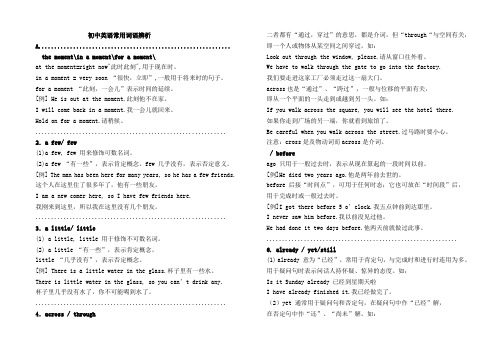
初中英语常用词语辨析A.............................................................the moment\in a moment\for a moment\at the moment=right now"此时此刻",用于现在时。
in a moment = very soon “很快,立即”,一般用于将来时的句子。
for a moment “此刻,一会儿”表示时间的延续。
[例] He is out at the moment.此刻他不在家。
I will come back in a moment.我一会儿就回来。
Hold on for a moment.请稍候。
............................................................. 2.a few/ few(1)a few, few 用来修饰可数名词。
(2)a few “有一些”,表示肯定概念,few 几乎没有,表示否定意义。
[例] The man has been here for many years, so he has a few friends. 这个人在这里住了很多年了,他有一些朋友。
I am a new comer here, so I have few friends here.我刚来到这里,所以我在这里没有几个朋友。
............................................................. 3.a little/ little(1) a little, little 用于修饰不可数名词。
(2) a little “有一些”,表示肯定概念。
little “几乎没有”,表示否定概念。
[例] There is a little water in the glass.杯子里有一些水。
初中英语常见词汇辨析

初中英语常见词汇辨析英语近义词辨析1.辨析:such和so:二者都表示程度,“如此;这样”,其区别为:注意:“such+a/an +adj+可数名词单数形式”可与“so+adj+a/an+可数名词单数形式”转换。
She is such a kind girl.=She is so kind a girl.2.each和every注意:each不能与almost,nearly及not搭配使用,而every可以。
Almost every window was broken.Not every student went on holiday.Each不能用于否定句,在否定句中应用none。
None of the books are mine.3.alone与lonelyShe was alone in the dark room.她独自一人呆在那间黑暗的屋子里。
He lives alone but he doesn't feel lonely.他独自生活,但并不感到孤独。
It's a lonely beach.那是一个人迹罕至的海滩。
4.stop doing sth与stop to do sth.One of +可数名词复数:……之一,做主语时,谓语动词要用单三形式。
12/ 1初中英语常见词汇辨析English is one of my favorite subjects.One of my friends knows you.5.few,a few与little,a littleThere are few eggs on the plate,so I must buy some.盘子里没几个鸡蛋了,所以我必须买一些There are a few eggs on the plate,so I needn't buy any at once.There's little milk in the glass.杯子里没多少牛奶了。
初中英语中考常见词汇辨析

be good with “善于应付……的;对……有办法”,常接名词或代词
be good for
“对……有好处”,其反义短语为be bad for/be harmful to,意为“对……有害; 对……有坏处”
be good to “对……好”,其同义短语为be kind/friendly to,后跟名词或代词
talk to/with sb.和某人交谈 talk of/about sth.谈到/谈论某事 talk back回嘴;顶嘴
6.辨析be good at/with/for/to
短语
含义及用法
be good at “擅长……;精通……”,相当于do well in, at后接名词、代词或动词的ing形式
【考点例句】 Alex is very good at languages.亚历克斯在语言方面很擅长。 As a politician, you need to be good with words.当政治家要善于辞令。 Fresh fruit and vegetables are good for you.新鲜的水果和蔬菜对你有好处。 My friend was good to me when I was ill.我生病时我的朋友对我关怀备至。
3.辨析sound, noise与voice
单词 sound noise voice
含义及用法 作名词表示“声音”时,是指自然界各种声音的总称 专指“噪音”或“不悦耳的声音” 指“说话声”或“嗓音”
短语 make a noise make a lot of noise in a loud/high voice in a low voice
7.辨析wear, put on, dress与(be) in
初中英语考试必考重点词语辨析汇总
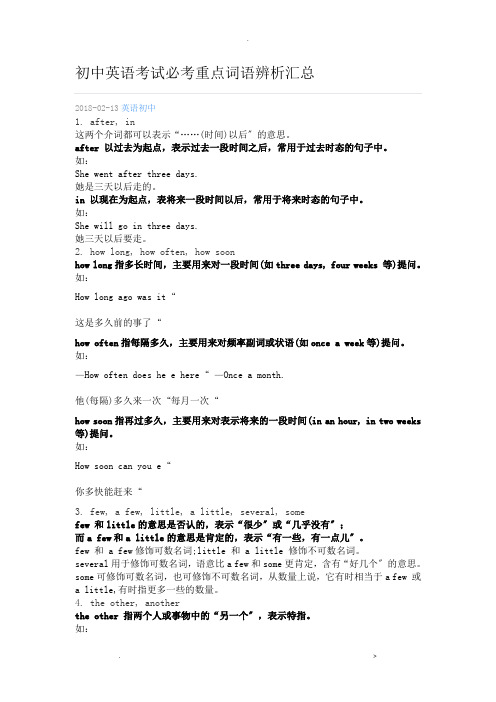
初中英语考试必考重点词语辨析汇总2018-02-13英语初中1. after, in这两个介词都可以表示“……(时间)以后〞的意思。
after 以过去为起点,表示过去一段时间之后,常用于过去时态的句子中。
如:She went after three days.她是三天以后走的。
in 以现在为起点,表将来一段时间以后,常用于将来时态的句子中。
如:She will go in three days.她三天以后要走。
2. how long, how often, how soonhow long指多长时间,主要用来对一段时间(如three days, four weeks 等)提问。
如:How long ago was it“这是多久前的事了“how often指每隔多久,主要用来对频率副词或状语(如once a week等)提问。
如:—How often does he e here“—Once a month.他(每隔)多久来一次“每月一次“how soon指再过多久,主要用来对表示将来的一段时间(in an hour, in two weeks 等)提问。
如:How soon can you e“你多快能赶来“3. few, a few, little, a little, several, somefew 和little的意思是否认的,表示“很少〞或“几乎没有〞;而a few和a little的意思是肯定的,表示“有一些,有一点儿〞。
few 和 a few修饰可数名词;little 和 a little 修饰不可数名词。
several用于修饰可数名词,语意比a few和some更肯定,含有“好几个〞的意思。
some可修饰可数名词,也可修饰不可数名词,从数量上说,它有时相当于a few 或a little,有时指更多一些的数量。
4. the other, anotherthe other 指两个人或事物中的“另一个〞,表示特指。
初中英语词汇辨析

【词语辨析】A1. look/ see/ watch(1)look表示“看、瞧”,强调看的动作,但不一定看到,以提醒对方注意。
look at跟静态物体(2)see是look这个动作的结果,意思是“看到”,see是及物动词,后面能直接跟宾语。
(3)watch常用于“看电视、看足球、看演出”等动态事物。
2. put on/ input on指“穿上”这一动作, take off脱下;wear穿着,强调的是状态;in是介词,表示“穿着”强调状态。
3. house/ home/familyhouse指居住的房子; home指一个人同家人共同经常居住的地方;family“家庭“,“家庭成员”。
B1.That's right/ That's all right/ All right.That’s right意为“对的”,表示赞同对方的意见、看法.That’s all right.意为“不用谢”、“没关系”,用来回答对方的致谢或道歉.All right.意为“行了”、“可以”,表示同意对方的建议或要求。
有时还可以表示“身体很好”"Please tell me about it" 请把此事告诉我。
"All right."好吧。
I am all right我身体很好.2. say/speak/talk/tellsay意为“说出”、“说道”,着重所说的话。
如:“I want to go there by bus” , he said . 他说,“我要坐汽车到那里去。
”Please say it in English .请用英语说。
speak “说话”,一般用作不及物动词(即后面不能直接接宾语) .如:I don’t like to speak like this.speak 作及物动词解时,只能和某种语言等连用,如:She speaks English well.她英语说得好。
初中英语常见词汇辨析

英语近义词辨析注意:“such+a/an +adj+可数名词单数形式”可与“so+adj+a/an+可数名词单数形式”转换。
She is such a kind girl.=She is so kind a girl.2.each和every注意:each不能与almost,nearly及not搭配使用,而every可以。
Almost every window was broken.Not every student went on holiday.Each不能用于否定句,在否定句中应用none。
None of the books are mine.H e lives alone but he doesn’t feel lonely.他独自生活,但并不感到孤独。
I t’s a lonely beach.那是一个人迹罕至的海滩。
4.stop doing sth与stop to do sth.English is one of my favorite subjects.One of my friends knows you.There are few eggs on the plate,so I must buy some.盘子里没几个鸡蛋了,所以我必须买一些There are a few eggs on the plate,so I needn’t buy any at once. There’s little milk in the glass.杯子里没多少牛奶了。
There’s a little milk in the glass.杯子里有一点牛奶。
我们班上任何人都知道这些歌手中的任何一个和他们歌曲中的任何一首。
这类形容词:interest和interesting、excited和exciting、surprised和surprisingThe boy was very excited when he heard the exciting news.Try做vi,意为“尝试、努力”I don’t think I can do it ,but I‘ll try.Try:做名词,”尝试”,have a try.“试一试”11.作“花费”:cost/spend/take /payI spent 200 yuan on a new coat.Don’t spend too much time watching TV.The dictionary cost me 89 yuan.It took Mr. Green an hour to finish his work yesterday.I paid 15 yuan for the pen .12.Through over acrossIt began to rain.However,we went out to look for the boy. You may be right but I don’t believe you.None of us went to the park.No one wants to leave.——who like that place?>——no one.Jim was writing a letter when I came in.另外,while 还可意为“而;然而”,表示两种情况的对比。
初中英语常用词语辨析完整版
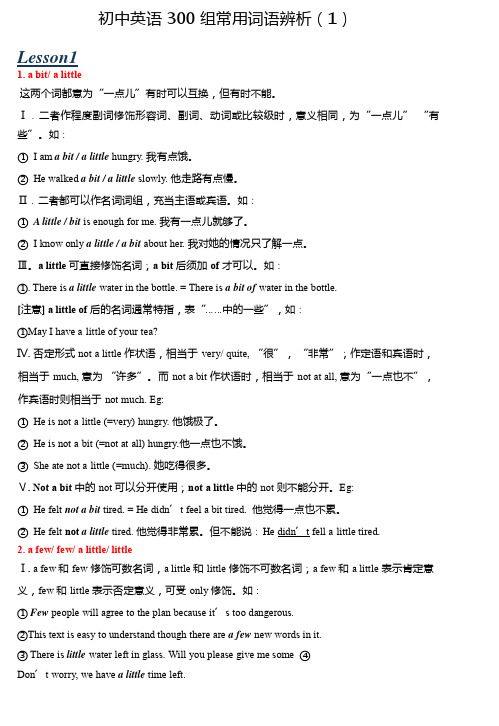
初中英语 300 组常用词语辨析(1)Lesson11. a bit/ a little这两个词都意为“一点儿”有时可以互换,但有时不能。
Ⅰ.二者作程度副词修饰形容词、副词、动词或比较级时,意义相同,为“一点儿”“有些”。
如:①I am a bit / a little hungry. 我有点饿。
②He walked a bit / a little slowly. 他走路有点慢。
Ⅱ.二者都可以作名词词组,充当主语或宾语。
如:①A little / bit is enough for me. 我有一点儿就够了。
②I know only a little / a bit about her. 我对她的情况只了解一点。
Ⅲ。
a little 可直接修饰名词;a bit 后须加of 才可以。
如:①. There is a little water in the bottle. = There is a bit of water in the bottle.[注意]a little of后的名词通常特指,表“……中的一些”,如:①May I have a little of your tea?Ⅳ. 否定形式 not a little 作状语,相当于very/ quite, “很”,“非常”;作定语和宾语时,相当于much, 意为“许多”。
而not a bit 作状语时,相当于not at all, 意为“一点也不”,作宾语时则相当于not much. Eg:①He is not a little (=very) hungry. 他饿极了。
②He is not a bit (=not at all) hungry.他一点也不饿。
③She ate not a little (=much). 她吃得很多。
Ⅴ. Not a bit中的not 可以分开使用;not a littl e 中的not 则不能分开。
Eg:①He felt not a bit tired. = He didn’t feel a bit tired. 他觉得一点也不累。
初中英语单词辨析汇总

初中英语单词辨析汇总1.happen , take place二者都有“发生”的意思。
happen指事情的发生,往往带有"偶然"的意思。
It happens that I am free today. 恰好今天我没有事。
take place指事先安排或策划好而后发生,没有"偶然"的意思。
2.must, have tomust表示说话人的主观看法;而have to则表示客观需要。
mustn\'t意为“不可以;不允许”;don\'t have to意为“不必”。
如:(1)My father had to work when he was ten years old。
(2)The play is not interesting. I really must go now。
3.arrive , reach , get to三者都有“到达”之意。
reach为及物动词。
They reached Tianjin yesterday.昨天他们到达天津。
arrive为不及物动词,后面接介词in或at。
get to常用于口语,可代替前二者。
4.because , because of二者均表示“因为”because是连词,引导状语从句。
We stayed at home because it rained.因为下雨,我们呆在家。
because of是短语介词,后面接名词性词语。
We stayed at home because of the rain .因为下雨,我们呆在家。
5.in front of, in the front ofin front of…意思是"在……前面",指甲物在乙物之前,两者互不包括;其反义词是behind(在……的后面)。
如:He walked in fount of me。
他走在我的前面。
There are some flowers in fount of the house。
初中英语词语辨析

初中英语词语辨析a bit,a little两个短语均可用来修饰形容词、副词及其比较级,意义同样,能够通用。
.They are feeling a bit/a little tired.他们感觉有点儿累。
修饰不行数名词时, a little 能够直接连用,但 a bit 需要加of ,再跟不行数名词。
.I need a little money to buy the book.I need a bit of money to buy the book.我需要一点钱买这本书。
not a little意为“特别” 、“很”,而not a bit则意为“一点也不” 。
.He is not a bit engry.他一点也不恼火。
She is not a little hungry.她很饿了。
above ,over两词在表示地点关系时,均有“在上方”的意思,但 above 表示“斜上方”,反义词为 below 。
over表示“正上方” ,反义词为 under 。
表示“超出”时,要用over 。
.The plane flew over the city of Nanjing.那架飞机飞越南京城而去。
表示气温、还把的“高于”,一般用above。
.The lowest temperature will be 8 ℃above zero tonight.over 今夜的最低温度将是零上8 摄氏度。
还有“多于” 、“超出”的意思,相当于more than 。
.Over fifty students are over there.那处有50 多个学生。
accept accept , receive指存心识的,经过考虑的,意为“接受”receive 是无心识的,没法预先考虑,意为“收到”。
.I received a gift from her,but I didn ’ t accept it.我收到了她给我的礼品,但我没有接受。
- 1、下载文档前请自行甄别文档内容的完整性,平台不提供额外的编辑、内容补充、找答案等附加服务。
- 2、"仅部分预览"的文档,不可在线预览部分如存在完整性等问题,可反馈申请退款(可完整预览的文档不适用该条件!)。
- 3、如文档侵犯您的权益,请联系客服反馈,我们会尽快为您处理(人工客服工作时间:9:00-18:30)。
初中英语常用词组辨析(31组)1、Look和See答:a. look一词单独用时,表示“看!”,通常要放在句首。
如:Look! There is a monkey in the tree. 看!树上有一只猴子。
b. look at表示要看具体的内容,如人或物。
如:Don’t look at me. Look at the blackboard, please.不要看我,请看黑板。
c. see表示看的结果,即“看到;看见”。
如:Can you see the words on the blackboard? 你能看见黑板上的字吗?see也用于“看电影”这个词组中,即:see a film2、Spend take paypay 的主语必须是人: (sb) pay money for sth. / pay sb.for sth.;spend的主语必须是人: (sb.) spend money/...for/on sth./ in doing sth. 在......方面花钱或精力;take表示做某事花费多少时间, 其主语一般是一件事 ; 有时也可以是人: It takes/ took sb. some time to do sth. 强调完成动作所花费的时间。
① It takes sb. some time to do sth.It took him half an hour to finish his homework.他花了半个小时完成家庭作业。
② sb. spends some time/money on sth./(in) doing sth.I spent thirty yuan on this book.我三十元买了这本书。
She spent ten minutes (in) getting there.她10分钟到达那儿。
③ sb. pays (some money) for sth.He paid a lot of money for the building.他买房子花了许多钱。
表“花费”的动词中,还有一个,即cost:cost 的主语必须是物或事: (sth.) cost(s) sb. money/life/health/time...;This coat cost me eighty yuan.这件上衣花了我80元。
3、on in at1.at介词at表时间、表地点。
(1)at表示时间,用于钟点前,用于时刻前,译为"在......时(刻)"。
如:at three/three o'clock 在三点。
at a quarter to six 六点差一刻。
at noon 在中午,at night 在夜晚, at midnight 在半夜at breakfast/lunch/supper 在吃早饭/午饭/晚饭时at this time of day 在每天这个时候(2)at表示地点,一般用于较小的地名(方)前,译为"在......"。
如:at home 在家,at the station 在车站(3)at表示处于......状态,译为"从事于......"。
如:at school 在上学,at work 在工作【相关链接】at加名词一般可与现在进行时态互换使用,表示正在进行的动作,试比较:They are at work./They are working.2.in小小介词in,用途却很多。
可表时间,表地点,表手段、方法、材料。
(1)in表示时间,用于泛指一天的上午、下午、晚上等;用于某个较长的时间,如年、月、季节等。
如:in the morning/afternoon/evening在上(下午)或晚上,in 2003在2003年,in the day/daytime在白天【相关链接】in还可以表示"从现在起一段时间以后"。
如:They will see you in a week.他们将在一周后去看你。
另外,in和at都可以表示时间,但in表示较长的时间,而at表示时间的某一点。
例如:He got up late in the morning and had a meal at noon.他早上起得晚,所以只吃午餐。
(2)in表示地点、场所,译为"在......里"、"在......中"。
如:in the factory 在工厂,in the room 在房间里,in the sun 在阳光下,in the middle of...在......的中央【相关链接】in和at都可表示地点,而in表示的地点比at所表示的地点大。
(3)in表示用语言,用......材料。
译为"用......,以......方式"。
如:in English用英语,in ink用墨水(4)in表示穿戴的状态,译为"戴着、穿着"。
如:in the white shirt穿着白色的衬衫,in the cap戴着帽子【相关链接】in表示"穿(戴)着"是介词,指状态,同wear一样。
in后接表示服装类的名词或表示颜色的词。
如:Kate is in a red skirt./Kate wears a red skirt.凯特穿着红裙子。
3.on介词on表示时间、地点、方位等。
(1)on表示时间,用于星期、日期(包括该天的各部分)。
如:on Sunday/Sundays,on Monday morning/afternoon/evening等。
on也用于某一日的名词前,用于公共节假日前。
如:On New Year's Day 在元旦,on Children's Day 在儿童节等。
(2)on表示地点、位置,有"在......旁"、"接近"、"靠近"之意。
如:a house on the main road 临大街的房子, sit on my right 坐在我的右边(3)on表示状态,译为"处于......情况中,从事于......"等。
如:on duty 值日,on holiday 度假(4)on表示"在......上面",用在表示物体的名词前。
如:on the box 在盒子上【相关链接】on和over都是介词,on表示"在......上面",指一物体与另一物体表面相接触;over表示"在......上方",指一物体与另一物体不接触。
试比较:There is a light on the desk.桌子上有盏台灯。
(light与desk接触)There is a light over the desk.桌子上方有一盏灯。
(light与desk不接触)【特别提示】表示"在......上",介词on与in必须注意习惯用法,否则会出错。
不妨比较一番:on the tree/in the tree都译为"......在树上"。
前者表示树上本身所长着的叶子、花、果实等;后者表示某物或某人在树上。
on the wall/in the wall都译为"在墙上"。
由于介词不同,在使用上有区别。
图画、黑板、风筝等"在墙上",是因为它们在墙的表面上,故用on the wall;门窗、钉子、洞、孔等"在墙上",是因为它们在墙的里面,故用in the wall。
4、clothes和clothingclothes泛指服装,包括上、下装,内、外衣clothing是衣着的总称,无复数形式,如:man''s clothing5、 a bit与a littlea bit和a littlea bit和a little都有“一点、少许”之意。
两进用作名词时,不能直接跟名词或代词,而必须用介of连接。
如:Well, Mrs Green, may be he has caught a bit of cold.There’s a little (=bit of) time left. 还剩一点儿时间。
She knows a bit (=little) of English. 她懂一点儿英语。
a bit 和a little也可用作副词,后面跟形容词或副词。
如:The jacket is a bit (=little) large. 这件夹克有点大。
That’s a bit expensive. Can I try them on, please?He ran a little faster than me. 他跑得比我快一点。
little还可用作形容词,表示“小的”、“几乎没有”。
如: a little girl(一个小姑娘)、 a little water(有一点水)注意:not a little 和not a bit的意思完全不同,前者是“许多、很”,后者是“一点儿也不”、“毫不”。
试对比:It’s not a bit cold. 天一点儿也不冷。
It’s not a little cold.天很冷。
6、everyday和every dayEveryday是形容词,意思是“日常用的”;every day“每天”是句词短语作状语。
例如:You must pay attention to your____English.A.every day’sB.everydayC.everyday’sD.every day7、have to和must首先,两者都可译为“应该”或“必须”,都是情态助动词,这是它们的共同之处;但在用法上有以下重要区别:⑴ have to表示客观条件决定不得不做某事语气较弱;must表示说话人主观的看法,语气较强。
例如:Do I have to say the words?我必须说这些话吗?You must work hard at English.你必须努力学习英语。
⑵must 只有一种形式,而have to有人称、数和时态的形式变化。
例如:She has to go to school earlier.她应当早一点儿上学。
(一般现在时,单数第三人称)I''ll have to write to him this evening.今晚我必须给他写信。
(一般将来时)He had to look after his sister yesterday.8、look,look at,see都是“看”的意思。
